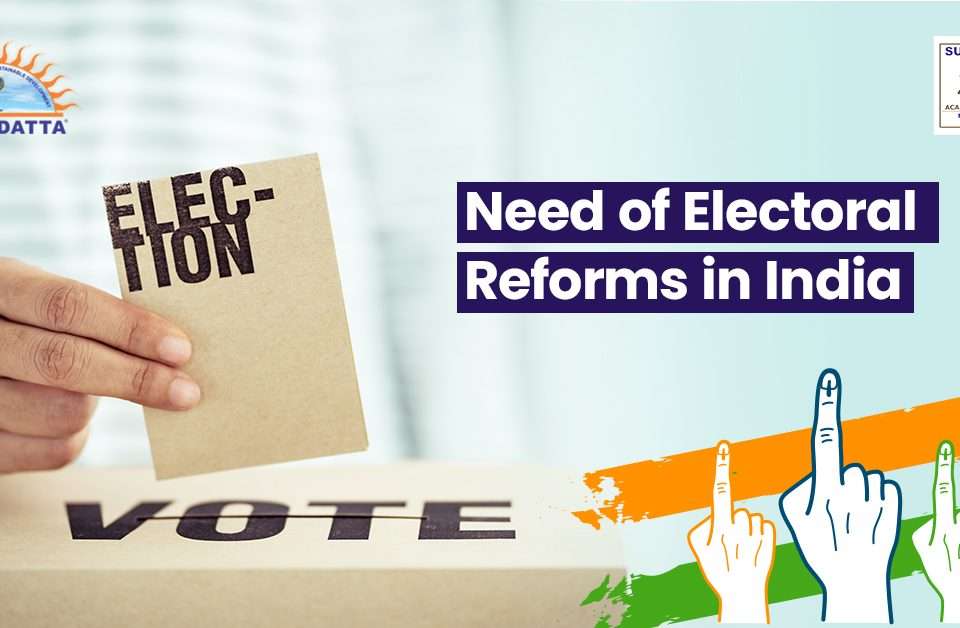Uniform Civil Code- Mr. Vijaydeep Munjunkar

Right to Practice Religion & Secularism in In India – Dr. Monika Sehrawat
April 27, 2025
Need of Electoral Reforms in India – Mr. Vijayadeep Munjunkar
April 27, 2025The Uniform Civil Code (UCC) is one of the most debated and aspirational goals of the Indian Constitution. As India moves towards greater modernization and integration, the conversation around the UCC continues to garner significant attention. But what does the Uniform Civil Code mean, and why is it so crucial for India’s diverse socio-legal fabric? This blog will delve into the concept, its constitutional provisions, challenges, and the way forward.
What is the Uniform Civil Code (UCC)?
The Uniform Civil Code refers to a single set of secular laws governing personal matters like marriage, divorce, inheritance, adoption, and maintenance for all citizens, irrespective of religion, gender, or ethnicity. Currently, personal laws in India are based on religious scriptures and traditions, which vary across communities.
The UCC aims to replace these fragmented personal laws with one unified code applicable to all Indian citizens. Its implementation is envisaged as a step towards ensuring equality, secularism, and national integration.
Constitutional Provisions Related to the UCC
The concept of a Uniform Civil Code finds its place in Article 44 of the Directive Principles of State Policy (DPSP) in the Indian Constitution. Article 44 states:
“The State shall endeavour to secure for the citizens a uniform civil code throughout the territory of India.”
While the DPSPs are not enforceable by any court, they serve as guiding principles for the governance of the country. The framers of the Constitution envisioned UCC as a means to achieve unity in diversity while upholding secularism and equality.
Significance of the Uniform Civil Code
1. Promotes Gender Equality
Personal laws of various communities often have provisions that discriminate against women. A Uniform Civil Code seeks to eliminate these inequalities, ensuring that men and women are treated equally under the law.
2. Ensures Secularism
India is a secular state, yet the coexistence of religion-based personal laws creates contradictions. A UCC would uphold the secular character of the Constitution by separating religion from personal law.
3. Simplifies Legal Processes
A single set of laws for all citizens simplifies the judicial process, reducing the burden on courts caused by the interpretation of multiple personal laws.
4. Fosters National Integration
The UCC can contribute to national integration by unifying diverse cultural and religious practices under a common legal framework.
Challenges in Implementing the UCC
1. Cultural and Religious Diversity
India’s strength lies in its diversity. Implementing a uniform law across communities with distinct traditions and customs is a daunting task. Many fear it may erode their cultural identity.
2. Opposition from Minority Groups
Minority groups often view the UCC as an infringement on their religious freedom, protected under Article 25 of the Constitution, which guarantees the right to practice and propagate one’s religion.
3. Lack of Political Consensus
The UCC has been a politically sensitive issue. Successive governments have hesitated to address it due to potential backlash from various communities.
4. Gender Sensitivity within UCC
For the UCC to be effective, it must be gender-sensitive and inclusive, addressing the unique needs of marginalized groups, particularly women.
Key Judicial Interventions
Over the years, the judiciary has played a crucial role in highlighting the need for a Uniform Civil Code. Some landmark cases include:
The Supreme Court granted alimony to Shah Bano, a Muslim woman, under Section 125 of the Criminal Procedure Code, overriding personal law. The case sparked a national debate on the UCC.
The court emphasized the need for a UCC to resolve conflicts arising from issues like polygamy.
3. John Vallamattom Case (2003)
The Supreme Court reiterated the importance of the UCC, stating that different personal laws create inequality.
The Road Ahead
Implementing the UCC requires careful deliberation and consensus-building. The following steps could pave the way for its realization:
1. Gradual Implementation
Rather than enforcing the UCC nationwide at once, a phased approach could be adopted, starting with optional codes or reforms in specific personal laws.
2. Public Awareness and Consultation
Education and dialogue are essential to address fears and misconceptions about the UCC. Stakeholders from all communities must be involved in the law-making process.
3. Ensuring Inclusivity
The UCC must respect India’s diversity while upholding constitutional values. It should be a reflection of equality, fairness, and justice.
4. Political Willpower
Political consensus and commitment are crucial for the successful enactment of the UCC. Governments must prioritize constitutional values over vote-bank politics.
Conclusion
The Uniform Civil Code is not merely a legal reform but a step towards building a more equitable and unified India. It embodies the ideals of equality, secularism, and national integration, which are the cornerstones of the Indian Constitution. However, its implementation requires a nuanced approach that respects India’s diversity while upholding constitutional principles.
If you are passionate about understanding and shaping India’s legal framework, pursuing a career in law can be a fulfilling choice.
Why Choose Suryadatta Law College (SLC) in Pune?
Established in 2022 under the Suryadatta Education Foundation, Suryadatta Law College (SLC) offers exceptional legal education to students aspiring for a successful career in law.
Why SLC?
- Affiliation and Approvals: SLC is affiliated with Savitribai Phule Pune University (SPPU), Pune, approved by the Bar Council of India, and recognized by the Government of Maharashtra.
- Courses Offered: The flagship B.A. LL.B. (5-year integrated course) equips students with a strong foundation in law and humanities.
- Comprehensive Curriculum: Designed to develop analytical thinking, advocacy skills, and a deep understanding of legal principles.
- State-of-the-Art Facilities: Modern infrastructure, a well-equipped library, and experienced faculty.
Join Suryadatta Law College and become a part of an institution committed to academic excellence and holistic development. Shape your future as a legal professional and contribute to India’s legal and constitutional growth.


